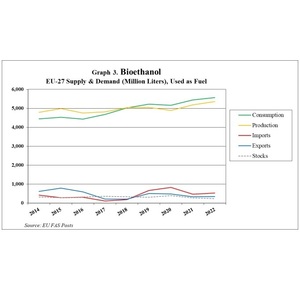EU ethanol production, consumption expected in increase in 2022

July 18, 2022
BY Erin Voegele
Ethanol consumption in the European Union was up an estimated 5.5 percent last year, surpassing the pre-COVID level of 2019 and setting a new record. EU ethanol consumption is expected to expand an additional 2.3 percent this year, according to an annual biofuels report filed with the USDA Foreign Agricultural Service’s Global Agricultural Information Network.
The report cites Russia’s invasion of Ukraine and the resulting high gasoline prices as a primary factor boosting the competitiveness of ethanol this year, with sales of E10 and E85 both expected to increase. Much of that expansion is anticipated in the French market, according to the report.
Fuel ethanol production in the EU is expected to reach 5.354 billion liters (1.41 billion gallons) this year, up from 5.19 billion gallons in 2021, 4.891 billion gallons in 2020 and 5.047 billion gallons in 2019. Cellulosic ethanol is expected to account for 50 million liters of that production this year, flat with last year, but up from 25 million liters in 2020 and 10 million liters in 2019.
Advertisement
According to the report, the EU is currently home to 55 first generation ethanol refineries, flat with last year and up from 54 in 2020 and 53 in 2019. The total combined capacity of EU ethanol plants is estimated at 6.42 billion liters for 2022, up from 6.36 billion liters last year, 5.89 billion liters in 2020 and 5.75 billion liters in 2019. EU ethanol plants are expected to operate at 83 percent capacity this year, compared to 81 percent in 2021, 83 percent in 2020 and 88 percent in 2019.
The EU also has four cellulosic ethanol plants, flat with 2021, but up from two in 2020 and 2019. The combined capacity of those facilities is estimated at 125 million liters in both 2021 and 2022, up from 40 million liters in 2019 and 10 million liters in 2020. The cellulosic plants are expected to operate at 52 percent capacity this year, up from 40 percent in 2021 and 50 percent in both 2019 and 2020.
Sugar beets are expected to be the primary ethanol feedstock in 2022 at 8.092 million metric tons, followed by corn at 6.64 million metric tons, wheat at 2.95 million metric tons, barley at 521,000 metric tons, rye at 487,000 metric tons and cellulosic biomass at 260,000 metric tons.
The EU is expected to import 538 million liters of fuel ethanol this year, up from 477 million liters in 2021, but down from 832 million liters in 2020 and 665 million liters in 2019. Fuel ethanol exports are expected to be at 354 million liters in 2022, compared to 342 million liters in 2021, 481 million liters in 2020 and 510 million liters in 2019.
Advertisement
Fuel ethanol consumption in the EU is expected to reach 5.57 billion liters this year, up from 5.443 billion liters in 2021, 5.159 billion liters in 2020 and 5.227 billion liters in 2019. Ethanol is expected to account for 6 percent of EU gasoline this year, compared to 5.9 percent in 2021, 6 percent in 2020 and 5.3 percent in 2019.
Germany is expected to be the top EU consumer of ethanol this year, at 1.456 billion liters, followed by France at 1.225 billion liters, the Netherland at 500 million liters, Poland at 361 million liters, Belgium/Luxembourg at 241 million liters, Spain at 213 million liters, Sweden at 203 million liters and Hungary at 194 million liters.
A full copy of the report can be downloaded from the USDA FAS GAIN website.
Related Stories
In a rapidly evolving energy landscape, the 41st International Fuel Ethanol Workshop & Expo will return June 9–11 to the CHI Health Center in Omaha, Nebraska. The event is recognized as the largest and longest-running ethanol conference in the world.
The U.S. EPA on April 11 reported that 1.82 billion RINs were generated under the RFS in March, down from 1.93 billion generated during the same month of 2024. Approximately 5.34 billion RINs were generated during the first quarter of 2025.
The U.S. EPA on April 17 published updated SRE data showing that five new SRE petitions have been filed under the RFS during the past month. According to the agency, 161 SRE petitions are currently pending,
The Iowa Biodiesel Board and Iowa Soybean Association on April 11 issued a statement expressing deep appreciation to Gov. Kim Reynolds for her biofuels advocacy. Reynolds on April 11 announced that she will not seek another term.
Metro Ports on April 8 announced significant environmental milestone in its voluntary efforts to reduce greenhouse gas emissions. By switching to renewable diesel, the organization reduced its carbon emissions by 85%.
Upcoming Events










